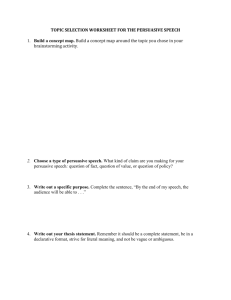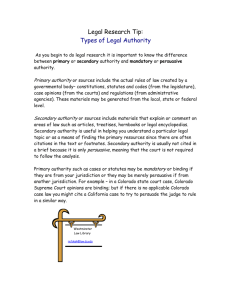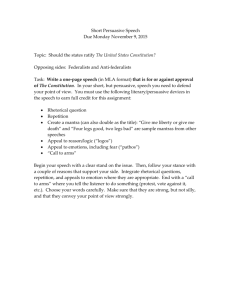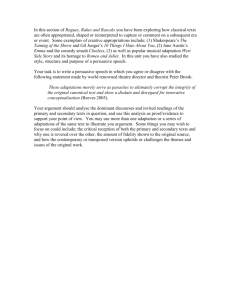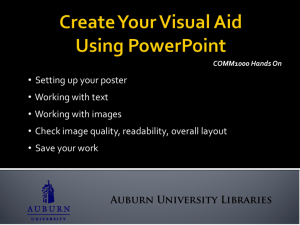Wrtg 1150: First Year Writing and Rhetoric
advertisement
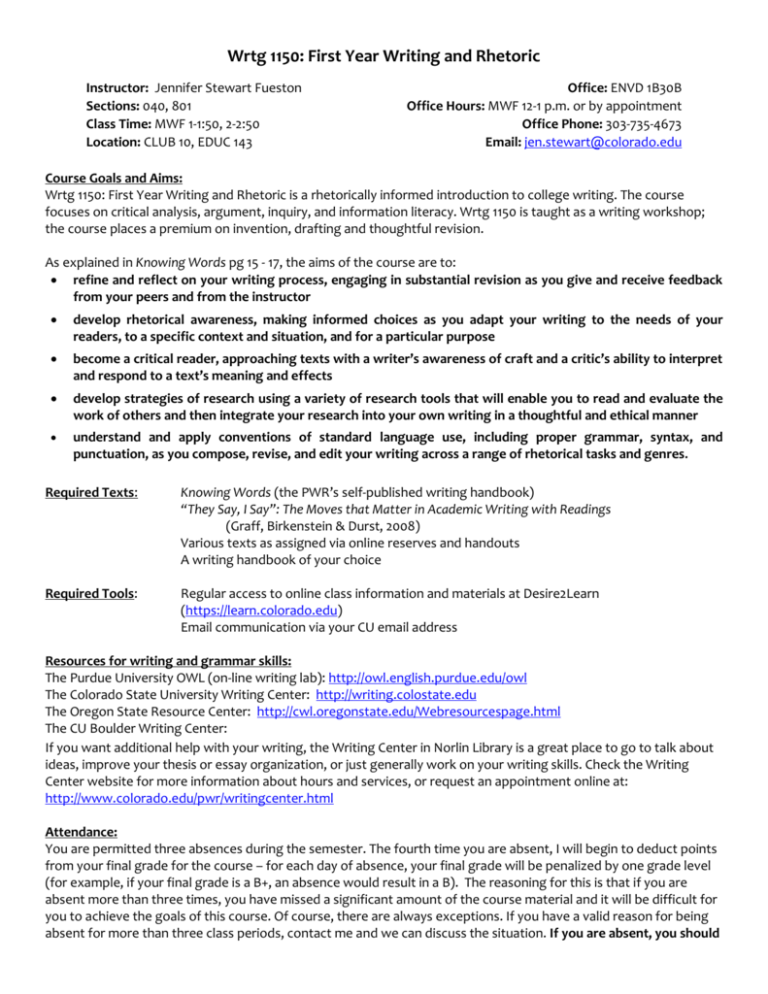
Wrtg 1150: First Year Writing and Rhetoric Instructor: Jennifer Stewart Fueston Sections: 040, 801 Class Time: MWF 1-1:50, 2-2:50 Location: CLUB 10, EDUC 143 Office: ENVD 1B30B Office Hours: MWF 12-1 p.m. or by appointment Office Phone: 303-735-4673 Email: jen.stewart@colorado.edu Course Goals and Aims: Wrtg 1150: First Year Writing and Rhetoric is a rhetorically informed introduction to college writing. The course focuses on critical analysis, argument, inquiry, and information literacy. Wrtg 1150 is taught as a writing workshop; the course places a premium on invention, drafting and thoughtful revision. As explained in Knowing Words pg 15 - 17, the aims of the course are to: refine and reflect on your writing process, engaging in substantial revision as you give and receive feedback from your peers and from the instructor develop rhetorical awareness, making informed choices as you adapt your writing to the needs of your readers, to a specific context and situation, and for a particular purpose become a critical reader, approaching texts with a writer’s awareness of craft and a critic’s ability to interpret and respond to a text’s meaning and effects develop strategies of research using a variety of research tools that will enable you to read and evaluate the work of others and then integrate your research into your own writing in a thoughtful and ethical manner understand and apply conventions of standard language use, including proper grammar, syntax, and punctuation, as you compose, revise, and edit your writing across a range of rhetorical tasks and genres . Required Texts: Knowing Words (the PWR’s self-published writing handbook) “They Say, I Say”: The Moves that Matter in Academic Writing with Readings (Graff, Birkenstein & Durst, 2008) Various texts as assigned via online reserves and handouts A writing handbook of your choice Required Tools: Regular access to online class information and materials at Desire2Learn (https://learn.colorado.edu) Email communication via your CU email address Resources for writing and grammar skills: The Purdue University OWL (on-line writing lab): http://owl.english.purdue.edu/owl The Colorado State University Writing Center: http://writing.colostate.edu The Oregon State Resource Center: http://cwl.oregonstate.edu/Webresourcespage.html The CU Boulder Writing Center: If you want additional help with your writing, the Writing Center in Norlin Library is a great place to go to talk about ideas, improve your thesis or essay organization, or just generally work on your writing skills. Check the Writing Center website for more information about hours and services, or request an appointment online at: http://www.colorado.edu/pwr/writingcenter.html Attendance: You are permitted three absences during the semester. The fourth time you are absent, I will begin to deduct points from your final grade for the course – for each day of absence, your final grade will be penalized by one grade level (for example, if your final grade is a B+, an absence would result in a B). The reasoning for this is that if you are absent more than three times, you have missed a significant amount of the course material and it will be difficult for you to achieve the goals of this course. Of course, there are always exceptions. If you have a valid reason for being absent for more than three class periods, contact me and we can discuss the situation. If you are absent, you should contact a classmate for the information and assignments you missed. I do not allow work to be turned in late except in cases of significant extenuating circumstance (health, family emergency, personal crisis, injury). Please talk with me if you are having difficulty meeting deadlines for any reason. Conferences: During the course of the semester, I will schedule several conferences (either individually or in groups) to discuss your writing. Conferences are regarded as a class period and I typically cancel a class day during the week of conferences. If you don’t show up for your scheduled time, it will be counted as an absence. If you are unable to attend and you know beforehand, please contact me to reschedule. Grading: 30% 20% 25% 25% Short (1 – 2 page) written assignments, midterm exam, RIOT, quizzes, daily preparedness and participation Unit 1: Rhetorical Analysis Essay Unit 2: Research Project, including 1) Research Proposal, 2) Annotated Bibliography, and 3) Research Essay Unit 3: Persuasive Texts #1 and #2 Guidelines and expectations for these essays and projects will be given out at the beginning of each unit and posted online at the class site http://learn.colorado.edu. Grading and evaluation of papers will also be discussed in detail prior to each deadline. Short written assignments and readings are listed in the following schedule, as well as posted to the online calendar. Fall 2011 Schedule: First Year Writing and Rhetoric (please note: dates and activities are tentative and subject to revision as determined by instructor) Date Mon, Aug 22 Wed, Aug 24 Fri, Aug 26 Mon, Aug 29 Wed, Aug 31 Fri, Sept 2 Mon, Sept 5 Topics and Activities Introduction to the course Homework for following class day - Read Knowing Words (KW) chapters 1 &2 What is good writing? - Bring 2 copies of “literacy Investigating what has shaped our own literacy biography” Genre and expectations: what do we expect of narratives? - Read chp. 6 in KW Workshop literacy biographies (Turn in one copy to instructor) - Read p. 73 – 77 in KW - Revise literacy biography Discuss “Learning to Read” (p 73 – 77 in KW) - Read syllabus What does it mean to be literate? What kinds of writing will you - Read chp. 4 in KW encounter in university? Review syllabus polices and unit assignments Unit 1: “Learning the Language” (see unit assignment sheet) - Find a persuasive text and How do writers get our attention? write a 1-page analysis of its Discuss chp. 4 of Knowing Words “appeals” (Turn in typed, final copy of “Literacy Biography) Types of persuasive texts: where do we encounter them, who - Read “Ships in the Desert” (on are their audiences, how can we begin to critically engage them? class site) - Answer critical reading SHARE the persuasive text you found, discuss in groups questions about “Ships” - Revise your analysis of persuasive text ETHOS and LOGOS at work in texts - Read “Political Language” and Reading persuasive texts critically “Pep Talk” handouts (on class Logical Fallacies site) (Turn in typed copy of 1-page analysis of persuasive appeals) - Find another persuasive political text and write a 1-page No Class: Labor Day Holiday analysis of how it “works” using the given frameworks Wed, Sept 7 Fri, Sept 9 Mon, Sept 12 Wed, Sept 14 Fri, Sept 16 Mon, Sept 19 Wed, Sept 21 Fri, Sept 23 Mon, Sept 26 Wed, Sept 28 Fri, Sept 30 Share examples of political texts and your analyses of them Discuss the political language frameworks from readings Analyzing political messages in images What is the difference between political language and propaganda? How do political messages use appeals in texts? Persuasiveness in Commercial texts and Advertising (Turn in typed, final copy of 1-page analysis of political language) Investigating advertising appeals Design as an aspect of appeal Discuss your writings on products with iconic status Reviewing types of persuasive texts How can we analyze texts? Choosing a “fruitful” text for analysis, reviewing writing from the unit (Turn in typed, final copy of 2-page “Iconic Product” paper) Bring ROUGH DRAFT of Rhetorical Analysis paper to class (2 copies) for Workshop Developing a rubric for evaluating good analysis papers Discuss “Regan’s ‘Bear Parable’” (Turn in 1 copy of Rough Draft to instructor) Structuring and unifying analysis papers Addressing grammar and mechanical concerns Wrap up Unit 1 Final revision strategies & questions Reviewing concepts for midterm exam, Oct 14th Rhetorical Analysis Paper DUE Unit 2: “Listening to the Conversation” (see unit assignment sheet) “The Academic Parlor” – What are the conversations in your field? 30 min for PWR Facilitated Observation Summarizing Skills Discuss Herbert & Dowd essays Research Questions Summarizing articles accurately The necessity of broad reading Forming fruitful Research Questions Mon, Oct 3 Creating a Research Proposal from initial research Begin to narrow down topics for research paper Wed, Oct 5 Evaluating and Analyzing types of sources Creating a useful Annotated Bibliography - Read “Cause” and “Election” rhetoric (on class site) - Revise your political text analysis - Read “Advertising” and “30second Spot Pitch” (on class site) - Read “I-pod” article from Beyond Words (on class site) - Write about a product you own that held “iconic status” and why it appealed to you so strongly (2 pages) CHOOSE one of your three texts (persuasive, political, commercial) as basis for your Rhetorical Analysis paper - Read “Regan’s ‘Bear Parable’” in KW p159-163 as example - Write ROUGH DRAFT - Revise your Rhetorical Analysis paper using feedback gained from the workshop - Revise your Rhetorical Analysis paper for any structure and grammar concerns - Finalizing your Rhetorical Analysis paper. Due by class time Monday -Read “They Say, I Say” Intro and chp. 1, Herbert & Dowd essays - Make a list of hot topics in your area of study/ or in public discourse -Read “They Say, I Say” chp 2, 3, Friedman and Zakaria essays - Do some research, summarize TWO sources that address TWO different hot topics on your list (4 sources total) - Complete Library Tutorials 1 & 2 “Think” and “Find” - Work on draft of research proposal - Complete Library Tutorials 3 & 4 “Evaluate” and “Cite” - work on finding sources for Annotated Bibliography THURS, Oct 6 (NOTE: Not our usual class day) Individual Conferences with instructor (attendance required): Bring at least ONE annotated source for your paper, and draft of Research Proposal INDEPENDENT RESEARCH DAY: No regular class period (use time for own research, visit Writing Center or Norlin Research Center) In-Class Workshop on Research Proposals and Annotations (bring 2 copies) - Revise research proposal and annotations, bring to class Oct 10th Wed, Oct 12 Library RIOT (Research Instruction Online Seminar) – go directly to Norlin Library room E303 Continue to read and annotate useful sources for paper Fri, Oct 14 MIDTERM EXAM (covering Unit 1 and content from the library tutorials) Mon, Oct 17 INDEPENDENT RESEARCH DAY: No regular class period (use time for own research, visit Writing Center or Norlin Research Center) Research Proposal and Annotated Bibliography DUE Summarizing and Explaining a “conversation” Critical Reading Fri, Oct 7 Mon, Oct 10 Wed, Oct 19 - Finalize Research Proposal and Annotated Bibliography -Read Berman, Amr and Cohen in “They Say, I Say” - Write up a 1 page summary of YOUR research findings - Read Knowing Words p 107 – 114 “Makeover Feminism” - Read “They Say, I Say” chapters 4, 5 & 6 - Begin draft of essay Fri, Oct 21 Discuss all “They Say, I Say” essays thus far Grouping different positions within a conversation Mon, Oct 24 Presenting Research effectively (Structure of Research Essays) Revising Research Question Wed, Oct 26 Principles to Using the Words & Work of other writers Presenting your conclusions appropriately Fri, Oct 28 Introductions and Conclusions Short In-Class Workshop on short draft Mon, Oct 31 Individual Conferences with instructor (attendance required): Bring complete draft for review Wed, Nov 2 In-Class workshop on full draft - Revise as needed Fri, Nov 4 Creating a rubric for evaluation of research papers Grammar and mechanics issues Final Draft of Research Essay due MONDAY Mon, Nov 7 Research Paper Due Unit 3: “Shaping the Conversation” (see unit assignment sheet) Re-Envisioning your research as a persuasive text for another audience/purpose Discuss student essays and their use of research information Identifying an audience for your persuasive text Read student essays in Knowing Words: “Cultural Chameleon,” “Harry Potter…,” “Corporate Political Power.” - Research some publications/community orgs. or sites that address your issue - Answer short “rhetorical situation” questions about an ideal publication/site for your persuasive text Wed, Nov 9 Fri, Nov 11 Types of Claims Shaping your text as a particular genre - Draft of essay, bring 2 pages of draft Friday - Read “They Say, I Say” chapters 7 & 8 - Read chapters 8, 9 & 10 of “They Say, I Say” - FULL DRAFT for Mon. - Make revisions as needed Mon, Nov 14 Creative writing techniques in persuasion Conventions of non-academic texts Wed, Nov 16 Structure and fluency in persuasive writing THURS, NOV 17th (NOTE: not our usual class day) Individual conferences with instructor (attendance required): Bring a complete draft of your persuasive text #1 Mon, Nov 21 – Fri, Nov 25 Thanksgiving Break – Enjoy your holiday! Mon, Nov 28 In-Class Workshop on persuasive text 1 Wed, Nov 30 Complete Course FCQs Looking at alternative genres and forms for persuasive text 2 Group brainstorming on options for text 2 Fri, Dec 2 Using other “composing” tools (guest lecture) - Create/write draft of persuasive text 2 Mon, Dec 5 Discuss conventions of other non-academic genres – what will allow your text to “work” in this context? - revising persuasive text 2 Wed, Dec 7 Create rubric for evaluation of persuasive texts Final grammar & fluency revisions of text #1 & #2 - final revisions to persuasive text 1 Fri, Dec 9 Last Day of Class Persuasive Text #1 DUE In-Class workshop on persuasive text #2 Final Exam (Time and place to be determined. Check mycuinfo for details) Present your final version of Persuasive text #2 (5 – 10 min. presentation) - finalize persuasive text #2 Week of Dec 12 – 16 - “They Say, I Say” chapters 8,9 and 10 - Draft your persuasive text #1 - continue work on persuasive text #1 draft - draft persuasive text 1 - consider and sketch out some options for text 2 - Read “Searching for Zion” and “Pearls Before Breakfast” (on class site) - Answer short “rhetorical situation” questions about an ideal publication/site for persuasive text 2 Notice of CU Boulder Campus Policies Disabilities If you qualify for accommodations because of a disability, please submit to me a letter from Disability Services in a timely manner so that your needs may be addressed. Disability Services determines accommodations based on documented disabilities. 303-492-8671, Willard 322, www.colorado.edu/disabilityservices Religious Observances Campus policy regarding religious observances requires that faculty make every effort to deal reasonably and fairly with all students who, because of religious obligations, have conflicts with scheduled exams, assignments, or required attendance. In this class, I ask that you contact me at least one week ahead of the date(s) that you will be absent so that we can discuss any assignments/class material that you will miss. Classroom Behavior Students and faculty each have responsibility for maintaining an appropriate learning environment. Those who fail to adhere to such behavioral standards may be subject to discipline. Professional courtesy and sensitivity are especially important with respect to individuals and topics dealing with differences of race, culture, religion, politics, sexual orientation, gender, gender variance, and nationalities. See policies at http://www.colorado.edu/policies/classbehavior.html and at http://www.colorado.edu/studentaffairs/judicialaffairs/code.html#student_code Discrimination and Harassment The University of Colorado at Boulder policy on Discrimination and Harassment, the University of Colorado policy on Sexual Harassment and the University of Colorado policy on Amorous Relationships apply to all students, staff and faculty. Any student, staff or faculty member who believes s/he has been the subject of discrimination or harassment based upon race, color, national origin, sex, age, disability, religion, sexual orientation, or veteran status should contact the Office of Discrimination and Harassment (ODH) at 303-492-2127 or the Office of Judicial Affairs at 303-492-5550. Information about the ODH, the above referenced policies and the campus resources available to assist individuals regarding discrimination or harassment can be obtained at http://www.colorado.edu/odh. The Honor Code All students of the University of Colorado at Boulder are responsible for knowing and adhering to the academic integrity policy of this institution. Violations of this policy may include: cheating, plagiarism, aid of academic dishonesty, fabrication, lying, bribery, and threatening behavior. All incidents of academic misconduct shall be reported to the Honor Code Council (honor@colorado.edu; 303-725-2273). Students who are found to be in violation of the academic integrity policy will be subject to both academic sanctions from the faculty member and nonacademic sanctions (including but not limited to university probation, suspension, or expulsion). Other information on the Honor Code can be found at http://www.colorado.edu/policies/honor.html and at http://www.colorado.edu/academics/honorcode/ CU Boulder Grading Scale A AB+ B BC+ C C- 92 – 100% 90 – 91 % 88 – 89 % 82 – 87 % 80 – 81% 78 – 79% 72 – 77 % 70 – 71 % D+ D DF 68 – 69 % 62 – 67 % 60 – 61% 59% and below
